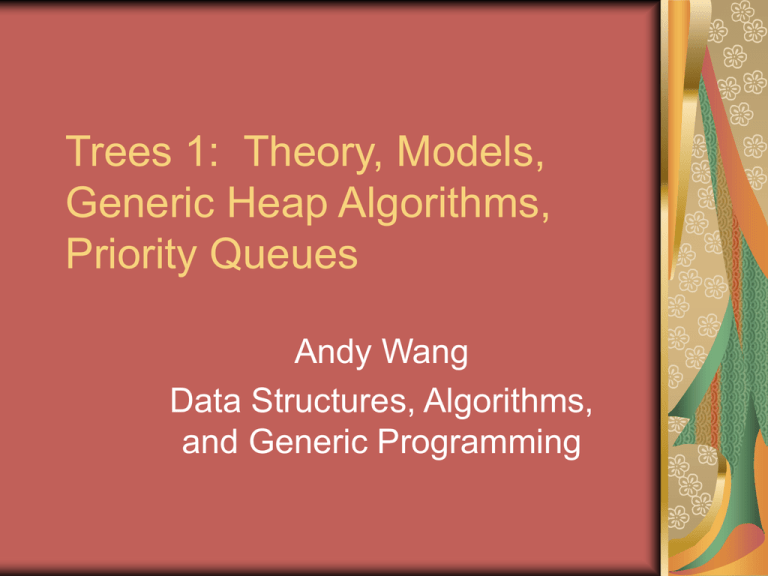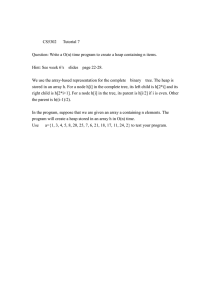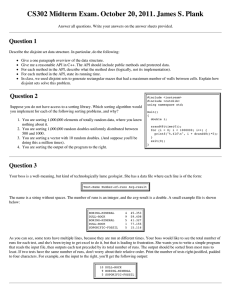Trees 1: Theory, Models, Generic Heap Algorithms, Priority Queues Andy Wang
advertisement

Trees 1: Theory, Models,
Generic Heap Algorithms,
Priority Queues
Andy Wang
Data Structures, Algorithms,
and Generic Programming
Review Question
Given the following information, can I
uniquely identify a tree?
Nodes listed based on an inorder
traversal:
D, B, F, E, A, C
Nodes listed based on a preorder
traversal:
A, B, D, E, F, C
Review Question
D B F E A C
A
B
D
E
F
C
Review Question
A
B
D
E
F
C
D B F E A C
x
x
x
x
x
x
Partially Ordered Trees
Definition: A partially ordered tree is a
tree T such that:
There is an order relation >= defined for
the vertices of T
For any vertex p and any child c of p, p
>= c
Partially Ordered Trees
Consequences:
The largest element in a partially
ordered tree (POT) is the root
No conclusion can be drawn about the
order of children
Heaps
Definition: A heap is a partially
ordered complete (almost) binary
tree. The tree is completely filled on
all levels except possibly the lowest.
root
3
1
0
4
2
Heaps
Consequences:
The largest element in a heap is the root
A heap can be stored using the vector
implementation of binary tree
Heap algorithms:
Push Heap
Pop Heap
The Push Heap Algorithm
Add new data at next leaf
Repair upward
Repeat
Locate parent
if POT not satisfied
swap
else
stop
Until POT
The Push Heap Algorithm
Add new data at next leaf
0
1
2
3
4
5
6
0
l
r
ll
lr
rl
rr
7
6
5
4
3
The Push Heap Algorithm
Add new data at next leaf
0
1
2
3
4
5
6
0
l
r
ll
lr
rl
rr
7
6
5
4
3
8
The Push Heap Algorithm
Repeat
Locate parent of v[k] = v[(k – 1)/2]
if POT not satisfied
swap
else
stop
0
1
2
3
4
5
6
0
l
r
ll
lr
rl
rr
7
6
5
4
3
8
The Push Heap Algorithm
Repeat
Locate parent of v[k] = v[(k – 1)/2]
if POT not satisfied
swap
else
stop
0
1
2
3
4
5
6
0
l
r
ll
lr
rl
rr
7
6
5
4
3
8
The Push Heap Algorithm
Repeat
Locate parent of v[k] = v[(k – 1)/2]
if POT not satisfied
swap
else
stop
0
1
2
3
4
5
6
0
l
r
ll
lr
rl
rr
7
6
8
4
3
5
The Push Heap Algorithm
Repeat
Locate parent of v[k] = v[(k – 1)/2]
if POT not satisfied
swap
else
stop
0
1
2
3
4
5
6
0
l
r
ll
lr
rl
rr
7
6
8
4
3
5
The Push Heap Algorithm
Repeat
Locate parent of v[k] = v[(k – 1)/2]
if POT not satisfied
swap
else
stop
0
1
2
3
4
5
6
0
l
r
ll
lr
rl
rr
7
6
8
4
3
5
The Push Heap Algorithm
Repeat
Locate parent of v[k] = v[(k – 1)/2]
if POT not satisfied
swap
else
stop
0
1
2
3
4
5
6
0
l
r
ll
lr
rl
rr
8
6
7
4
3
5
The Pop Heap Algorithm
Copy last leaf to root
Remove last leaf
Repeat
find the larger child
if POT not satisfied
swap
else
stop
Until POT
The Pop Heap Algorithm
Copy last leaf to root
0
1
2
3
4
5
6
0
l
r
ll
lr
rl
rr
8
6
7
4
3
5
The Pop Heap Algorithm
Copy last leaf to root
0
1
2
3
4
5
6
0
l
r
ll
lr
rl
rr
5
6
7
4
3
5
The Pop Heap Algorithm
Remove last leaf
0
1
2
3
4
5
6
0
l
r
ll
lr
rl
rr
5
6
7
4
3
The Pop Heap Algorithm
Repeat
find the larger child
if POT not satisfied
swap
else
stop
0
1
2
3
4
5
6
0
l
r
ll
lr
rl
rr
5
6
7
4
3
The Pop Heap Algorithm
Repeat
find the larger child
if POT not satisfied
swap
else
stop
0
1
2
3
4
5
6
0
l
r
ll
lr
rl
rr
5
6
7
4
3
The Pop Heap Algorithm
Repeat
find the larger child
if POT not satisfied
swap
else
stop
0
1
2
3
4
5
6
0
l
r
ll
lr
rl
rr
7
6
5
4
3
Generic Heap Algorithms
Apply to ranges
Specified by random access iterators
Current support
Arrays
TVector<T>
TDeque<T>
Source code file: gheap.h
Test code file: fgss.cpp
Priority Queues
Element type with priority
typename T t
Predicate class P p
Associative queue operations
void Push(t)
void Pop()
T& Front()
Priority Queues
Associative property
Priority value determined by p
Push(t) inserts t, increases size by 1
Pop() removes element with highest
priority value, decreases size by 1
Front() returns element with highest
priority value, no state change
The Priority Queue Generic Adaptor
template <typename T, class C, class P>
class CPriorityQueue {
C c;
P LessThan;
public:
typedef typename C::value_type value_type;
int Empty() const { return c.Empty(); }
unsigned int Size() const { return c.Size(); }
void Clear() { c.Clear(); }
CPriorityQueue& operator=(const CPriorityQueue& q) {
if (this != &q) {
c = q.c;
LessThan = q.LessThan;
}
return *this;
}
The Priority Queue Generic Adaptor
void Display(ostream& os, char ofc = ‘\0’) const {
c.Display(os, ofc);
}
void Push(const value_type& t) {
c.PushBack(t);
g_push_heap(c.Begin(), c.End(), LessThan);
}
void Pop() {
if (Empty()) {
cerr << “error” << endl;
exit(EXIT_FALIURE);
}
g_pop_heap(c.Begin(), c.End(), LessThan);
c.PopBack();
}
};





